Skip the strong, artificial scents and chemicals in store-bought alternatives by using these DIY, natural fabric softeners that are inexpensive, easy to use, and non-toxic.
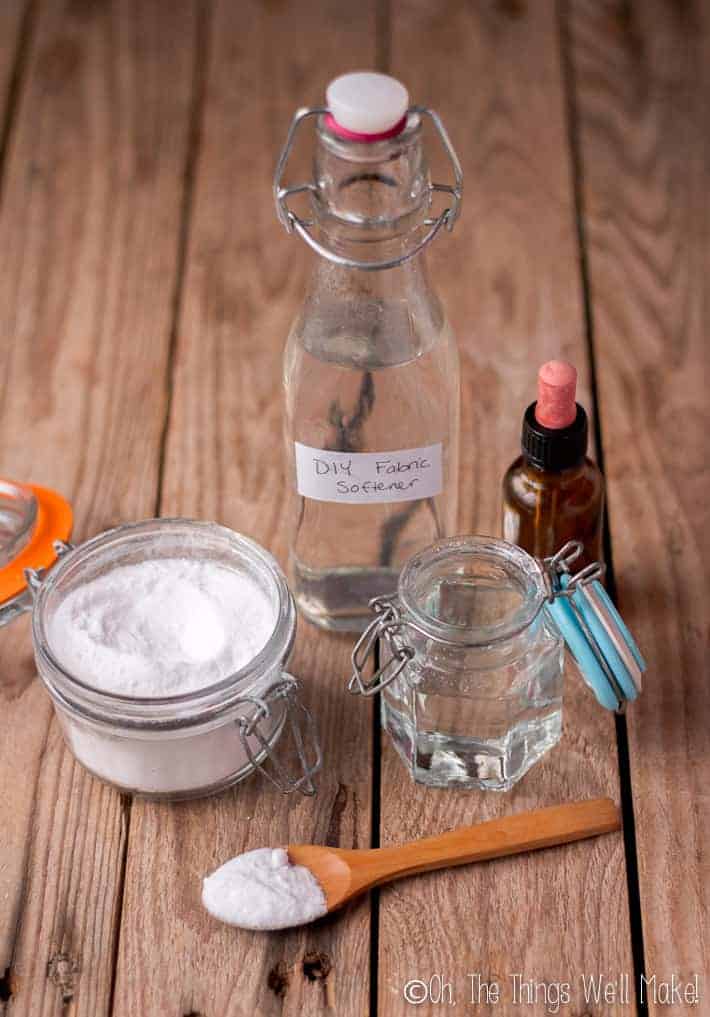
Using wool dryer balls to soften your clothes
A couple of years ago, I showed you how to make wool dryer balls as a natural alternative to commercial dryer sheets. Wool dryer balls are great for throwing in the dryer with your clothes because they can help speed up drying time as well as help soften the clothes. Since I use an unscented homemade laundry detergent, I love to add a couple of drops of essential oils to the balls before throwing them in the dryer to give my clothes a very subtle, natural scent.
(When I first wrote this post I was still using a soap-based homemade laundry “detergent” instead of my new surfactant based one. Also, I should add that I have since been informed that there is a risk, albeit small, of EO’s igniting in the dryer when used in dryer balls. When used in such small amounts, it’s highly unlikely, but do so at your own risk! It may be better to scent your clothes with homemade lavender sachets in your closet instead!)
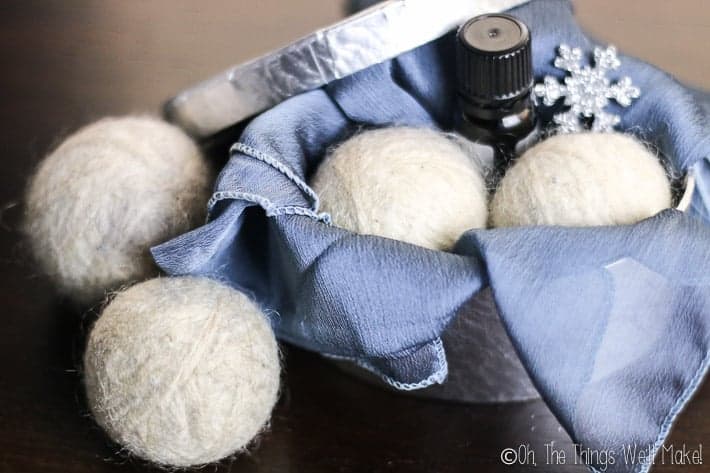
While wool dryer balls are a great green alternative to commercial dryer sheets, an even greener alternative is to line dry your clothes, of course. Obviously, if you line-dry your clothing, you can’t really soften it with wool dryer balls.
I stopped using commercial fabric softener years ago. Not only do I find their strong, artificial scents overwhelming and nauseating, but I also was told by some of my local friends that commercial fabric softeners are responsible for eating away at the elastic on clothes. When I thought back to how long my swimsuits used to last me, and then how quickly they were wearing out once I had moved here (aka. when I started using fabric softener), I just stopped using it cold turkey. I mean, I really only had begun in the first place because I followed what everybody else was doing in this region with hard water.
Do you really need to use fabric softener?
Fabric softeners aren’t necessary, but they can leave your clothes feeling softer. This is especially true for places with hard water. While I personally hate the scent of fabric softeners (and I actually secretly rewash almost everything my mother-in-law washes and gives back to me because I can’t stand the fragrance), some people use fabric softeners because they love the way it makes their clothes smell.
To be honest, I didn’t notice a huge difference in my clothes after ditching the fabric softener, other than the fact that they no longer reeked of chemicals. That said, I made the change at around the same time as we moved to a new house, which meant it was same time that I started drying my clothes in the dryer again (with my wool dryer balls). Up until that point, I had been living in an apartment and drying my clothes on a clothesline. Clothes dried in that way have a tendency to feel a bit crunchier than those dried in the dryer.
For those that do line dry, and I applaud you 100%. Luckily for you, there are easy, inexpensive natural fabric softeners that you can use to help soften your laundry without all of the toxic chemicals. Even if you use a dryer with dryer balls, I’m sure there are times that these natural fabric softeners can come in handy.
So far, I’ve only tried using vinegar in the final rinse, but from what I’ve been reading, the other ideas here also work really well. Baking soda has the extra benefit of helping whiten clothes, and helping to remove odors.
You can use these natural fabric softeners alone, or combine them. I personally wouldn’t combine vinegar (an acid) with baking soda (a base) because they would probably cancel each other out. On the other hand, vinegar and glycerin combined could make a great liquid softener, and salt and baking soda together would probably make a great powder one. If I do get around to trying them out together, I’ll try to remember to update this post with my findings.
Why choose natural fabric softeners?
Commercial fabric softeners include a number of ingredients that are potentially damaging to our health and that can pose a risk to the environment.
The fragrances themselves can be comprised of a number of questionable ingredients. They can aggravate asthma in some people and can make others, like me, feel dizzy when around them. They can also irritate the skin of those with atopic dermatitis and other skin conditions. (That’s the case with my son, and it’s why I avoid using detergents and softeners with artificial fragrances.)
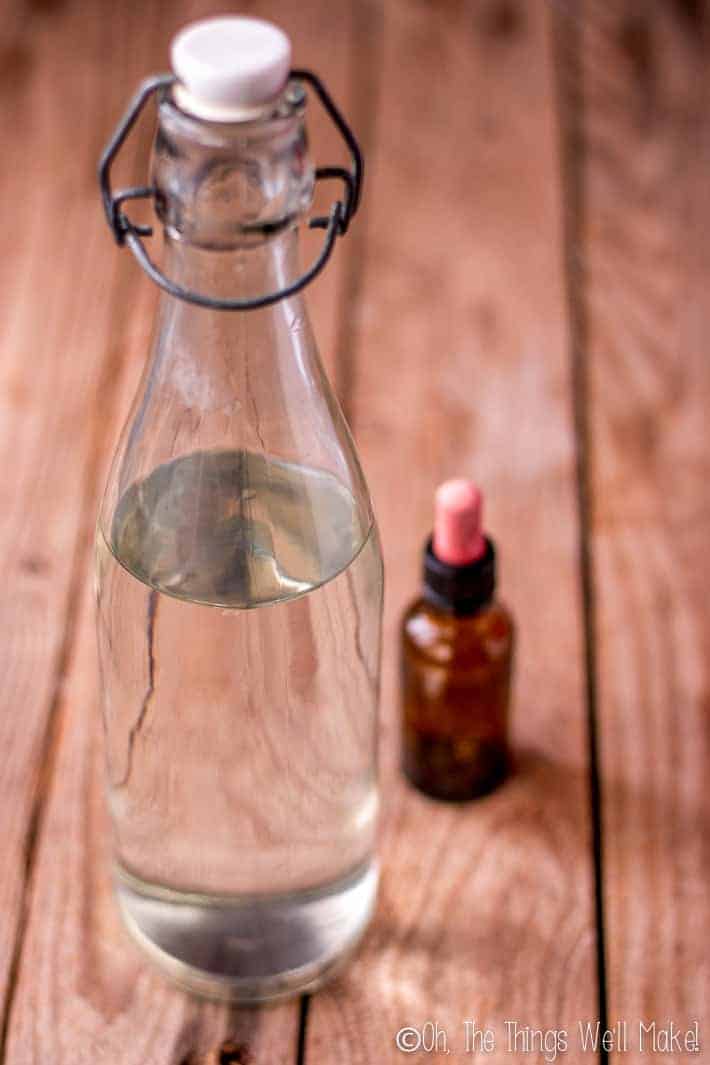
White Vinegar as a Fabric Softener
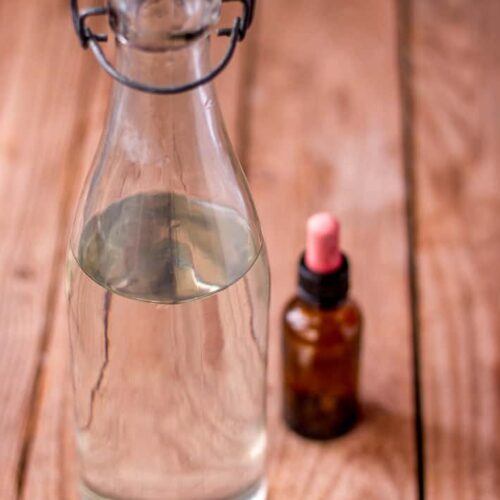
White Vinegar as a Fabric Softener
Materials
- 1 gallon white vinegar
- 30 drops essential oil optional- for scent
Instructions
- Mix together the vinegar and essential oils of your choice. You can choose essential oils whose fragrance you like or can choose to use disinfecting essential oils.
- Pour the vinegar directly in your washing machine’s softener dispenser. You can use between 1/4 and 1/2 cup of vinegar in the final rinse of each load of laundry, dependent upon the size of the load and the hardness of your water.
Baking Soda as a Fabric Softener
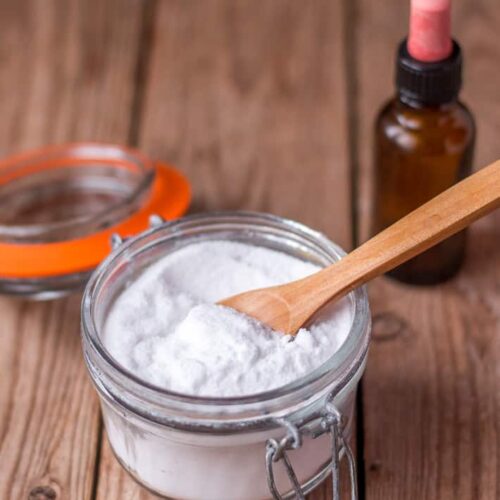
Baking soda Fabric Softener
Materials
- 2 cups baking soda
- 15 drops essential oil optional
Instructions
- Mix together the baking soda and an essential oil of your choice. (The essential oils will help add fragrance and are optional.)
- Add 1/2 cup of the mixture (or just baking soda) to your washing machine during its rinse cycle.
Salt as a Natural Fabric Softener
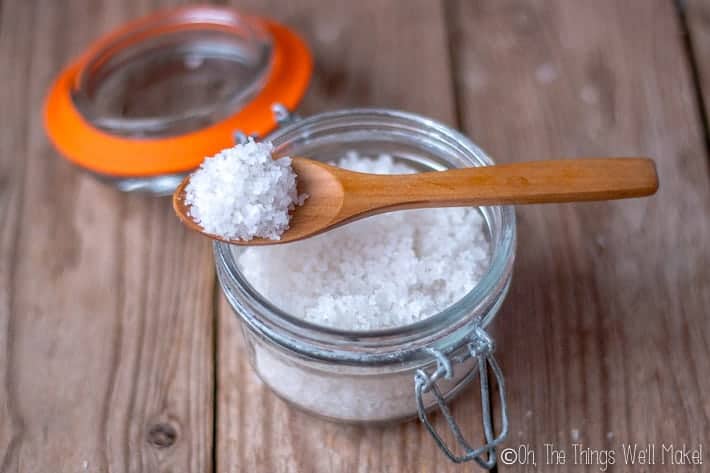
Salt Based Fabric Softener Crystals
Materials
- 4 cups salt
- 30 drops essential oil(s) optional
Instructions
- Mix the two ingredients together in a jar.
- Add around 1/2 cup of the salt mixture to your laundry. You can either add it with your detergent (allowing you to add vinegar to the rinse cycle), or you can add it during the final rinse.
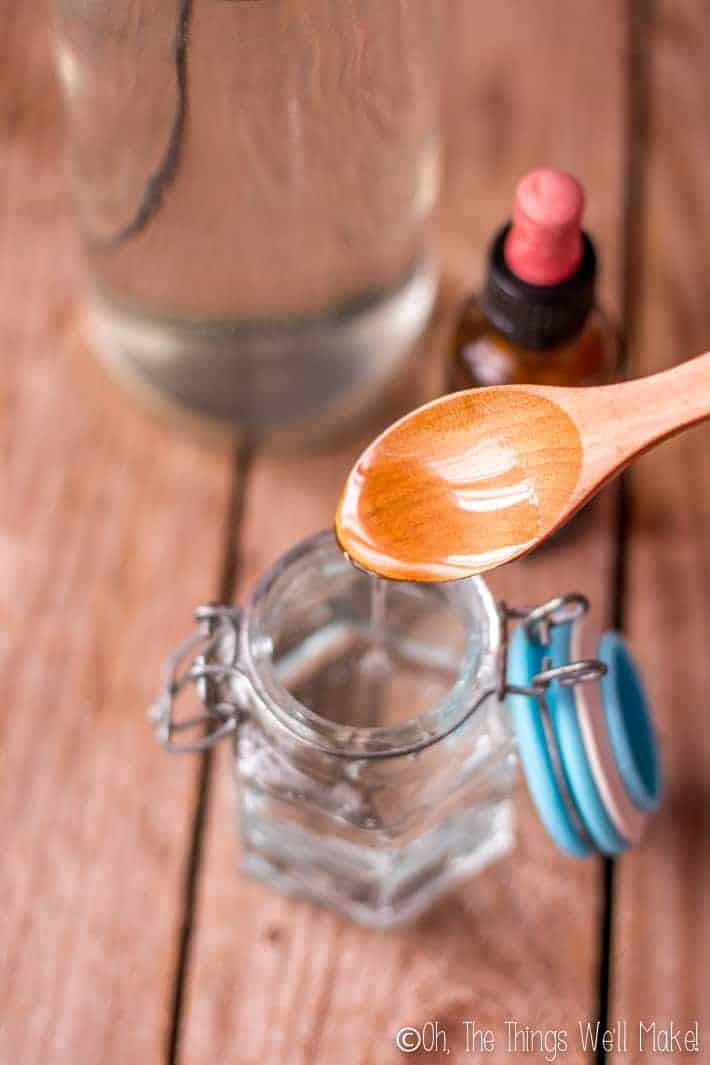
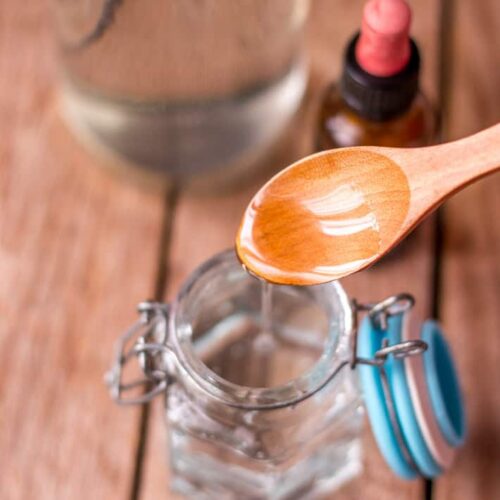
Vegetable Glycerin Fabric softener
Materials
- 1 gallon distilled water
- 1/2 cup glycerin
- 30 drops essential oil optional
Instructions
- Pour the glycerin into a gallon bottle. Fill the rest of the bottle with distilled water. Shake the bottle to mix the ingredients well.
- For a softer, chemical-free laundry, pour half a cup of the mixture into your washing machine during its rinse cycle.
 Español
Español
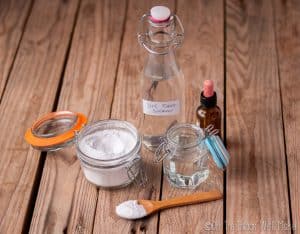
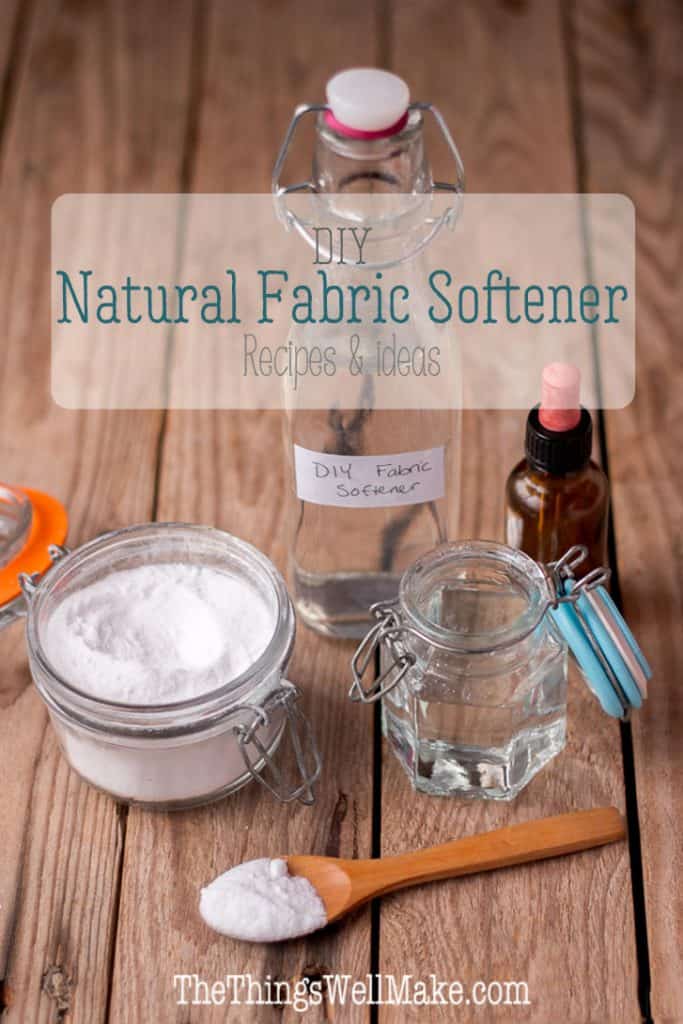
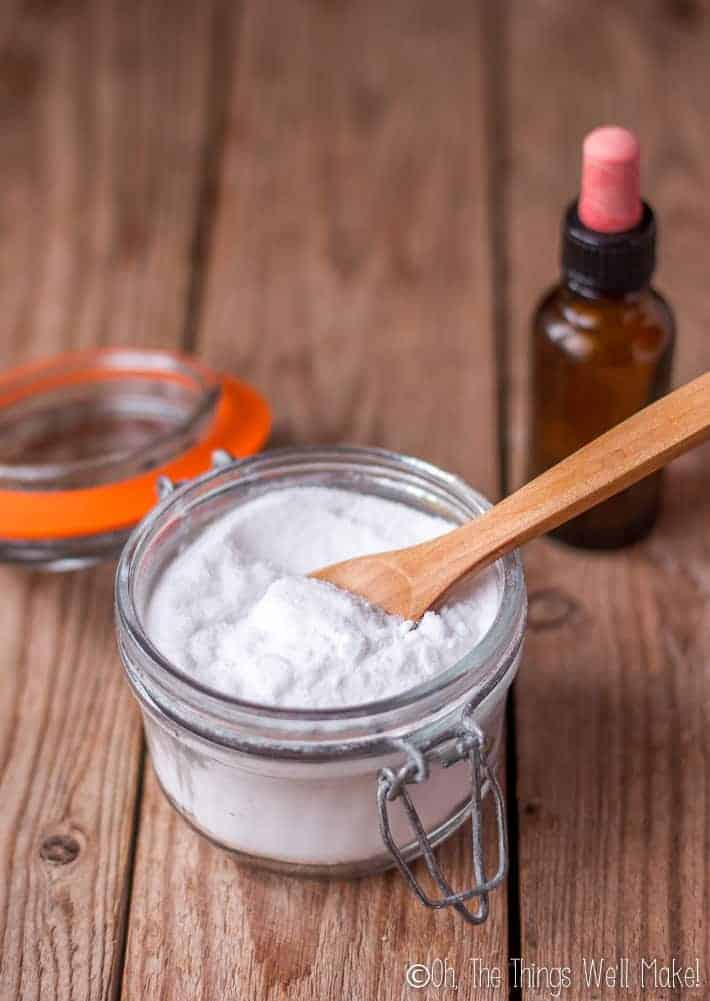
 Easy, Homemade Fermented Ketchup: Fermented Foods at Every Meal
Easy, Homemade Fermented Ketchup: Fermented Foods at Every Meal
Johnny Fabrics
This is a great way to make chemical free fabric softener. thank you for your helpful content. I will try
february
I’ve been using your fabric softener recipe…but I can still smell a hint of vinegar when I take my clothes out of the dryer. My husband really hates the smell…is there anything I can do to prevent this?
Tracy Ariza
Well, normally the scent disappears when dry, especially if you add essential oils to it.
My husband also hates a vinegar smell.
Perhaps you could either try with less (adding a stronger scented essential oil) or try one of the other recipes?
february
What a great idea. I’d love to try it. Dryer sheets are expensive. Thanks for posting!
Andreia
Is the smell from the white vinegar overpowered by the essential oils? Will it disappear on its own? Although I hate the smell of commercial softeners, I would hate to smell like vinegar…
Thank you! Been loving all your posts so far!
Tracy Ariza
Hi Andreia,
The times I’ve tried it, I’ve never smelled the vinegar after the clothes have dried. Most people say the same thing. (I normally only use the dryer balls now, but, again, I now have a water softener too.)
I did just get a comment from someone who said that they still noticed the smell after the clothes dried, though. It may depend on the vinegar, or maybe she didn’t add essential oils.
Perhaps, if you’re worried about it, you could start with a small amount and see how it goes- and then increase the amount as needed if you see that it doesn’t leave a scent.
Margaret
Always knew dryer sheets had to be horrible for your health. I didn’t know all the other ways to soften clothes. Thank you!! I enjoy reading your posts and learn something every time. Keep up with excellent information!
Tracy Ariza
Happy to help! 🙂
Angie
How many should I put it per each way?
Tracy Ariza
Hi Angie,
This had been a guest post by someone else, but I realized that it was lacking a lot of information and honestly didn’t like the way it was written. So, I just did a complete overhaul of the post and added amounts. Hopefully it will be more helpful now?
Farhan Thakur
thanks for adding the amounts, helpful.
Tracy Ariza
You’re welcome!
Hyunji
Hello Tracy, thank you for sharing the great information. I have questions. Is 3/4 cup of vinegar for one portion? And is it okay if I add the essential oil to glycerine&water? Thanks.
Tracy Ariza
Hi Hyunji,
I just completely re-wrote the entire post so that the amounts you use are clearer now!
Yes, you can optionally add essential oils to any of the recipes above. 🙂
Yolanda
Hi, I also add essential oils to my baking soda and use that as a fabric softener. But I read somewhere that the oils in the laundry can start a fire in your dryer. Is that true? I only wash my clothes with cold water. No warm water for laundry where I live.
Tracy Ariza
Hi Yolanda,
That’s an interesting question, and one I hadn’t researched until now. It had been suggested to me years ago to add a couple of drops of lavender EO to my dryer balls, and I’ve been doing that successfully without issue for years.
I found this interesting article which basically covers this topic. Basically they are saying that it is theoretically possible, but that it is unlikely because you are using such small amounts. I’ll be updating all of my laundry posts this week with the new information- so thank you for bringing the possibility to my attention.
sharon
Is it ok to tumble dry clothes, after using vegetable glycerin in the final rinse cycle, as a softener? Especially using high heat? Is it not flammable?
Tracy Ariza
Hi Sharon,
While glycerin is flammable, it has a very low flammability rating. It needs to be heated very hot to catch on fire.
In this case, you are using it with water. I just don’t see how there could be enough glycerin left in the clothes to pose any problem.
Jean
Where do I buy vegetable glycerin?
Tracy Ariza
Hi Jean,
You can usually buy it at cosmetic supply or soap making supplu type places. I always order it online.
If you don’t usually order from those types of stores, you can also find glycerin online at Amazon. (I’m linking to one example.)
I hope that helps!